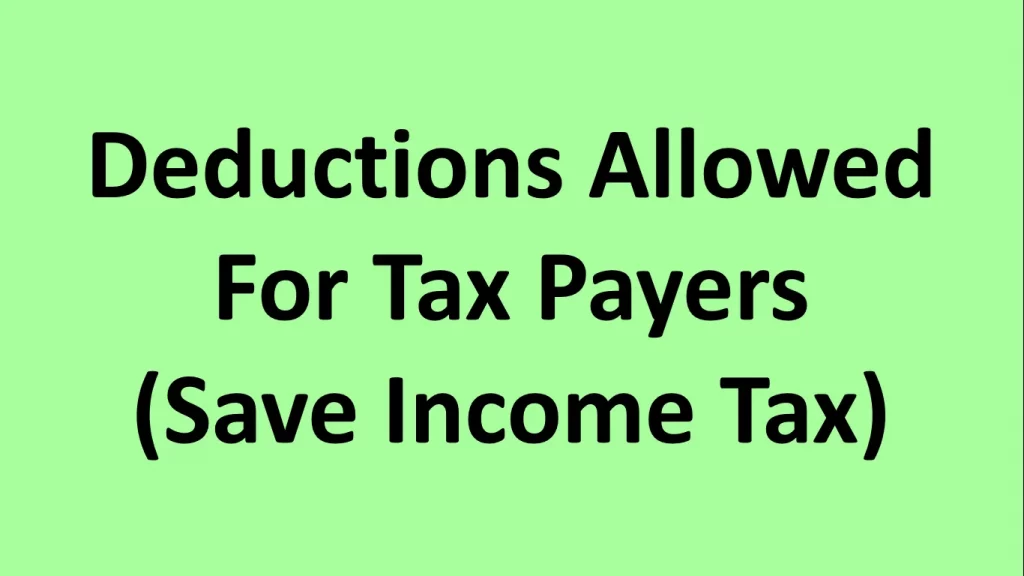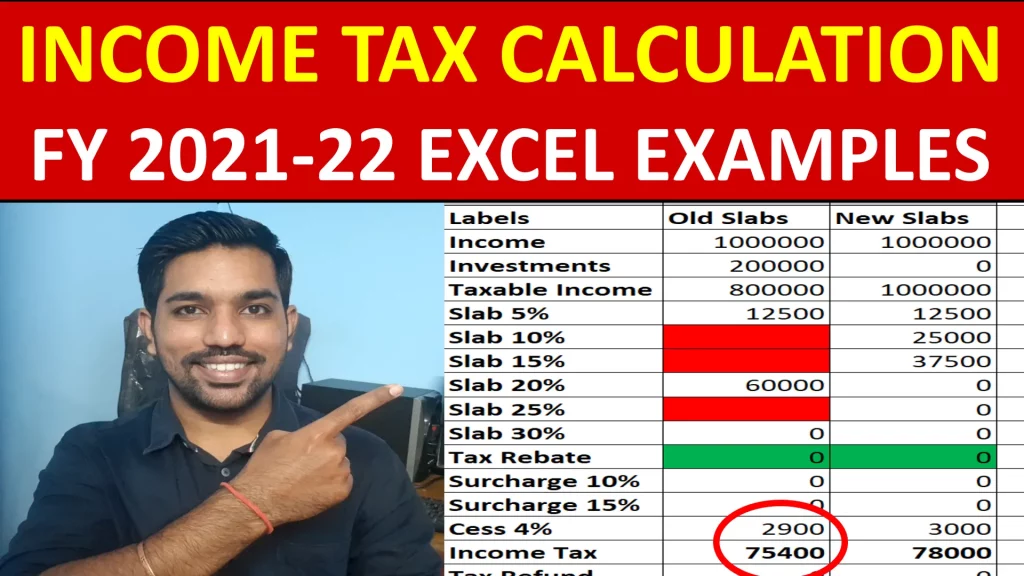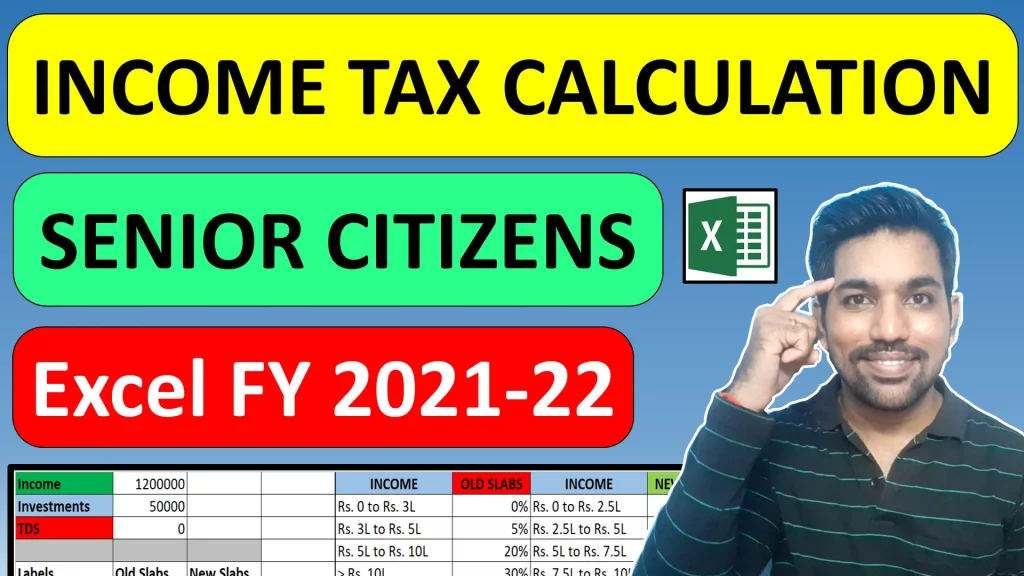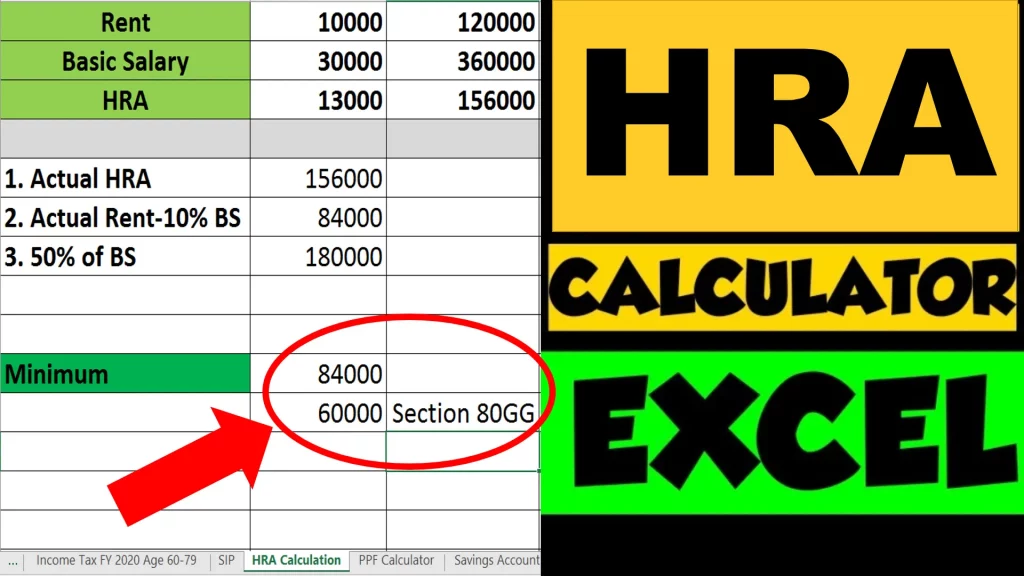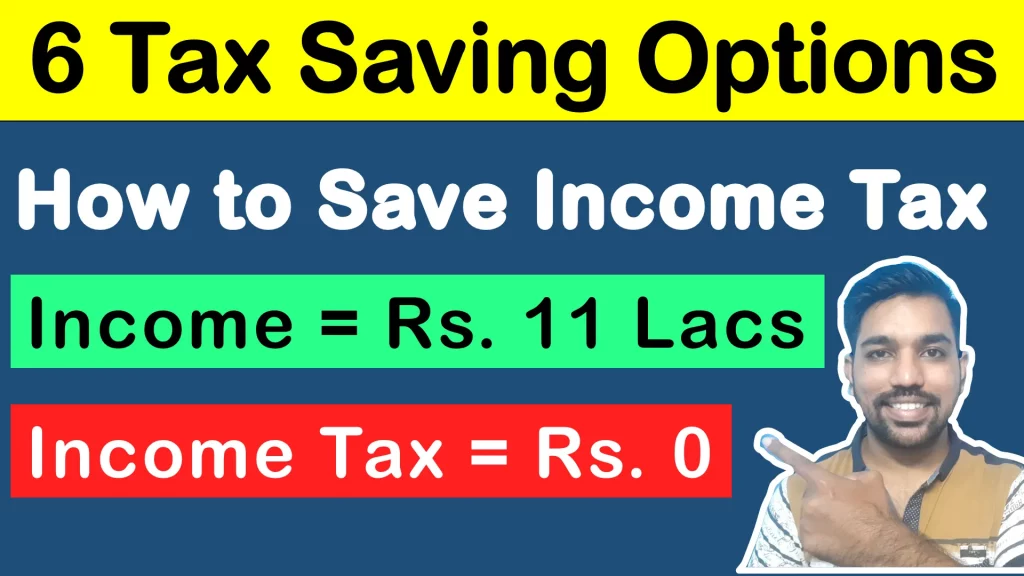Deductions are part of income tax which helps to save income tax in India. Below are the Deductions Allowed for Tax Payers with limits for FY 2024-25 so that you can save income tax.
Important Deductions Allowed for Tax Payers include Section 80C (Rs. 1.5 Lakh), Section 80CCD(1B) (Rs. 50,000), HRA (House Rent Allowance), Section 24 (Rs. 2 Lakh), etc. Many of these sections are also applicable for salaried employees including standard deduction of Rs. 50,000.
- All Deductions Allowed for Tax Payers in Old Tax Regime
- Deductions Allowed For Tax Payers – Table
- Tax Deductions under Section 16
- Tax Deductions under Section 80C
- Tax Deductions under Section 80D
- Tax Deductions under Section 80E
- Deductions under Section 80G
- Tax Deduction under Section 80TTA
- Tax Deduction under Section 80TTB
- Deduction under Section 80GG
- Tax Deduction under Section 24(b)
- Tax Deduction under Section 10(13a)
- Conclusion
- Frequently Asked Questions
All Deductions Allowed for Tax Payers in Old Tax Regime

Watch more Videos on YouTube Channel
As seen above, you can use various deductions allowed for tax payers under old tax regime to save income tax.
Let us see all these deductions with limits in table below.
Deductions Allowed For Tax Payers – Table
| Sections | Limits in FY |
|---|---|
| Section 16 (Standard Deduction) | Rs. 50,000 |
| Section 80C (Investments & Expenses) | Rs. 1,50,000 |
| Section 80D (Medical Insurance) | Rs. 1,00,000 |
| Section 80E (Education Loan) | No Limit |
| Section 80G (Charity) | Specified Limits |
| Section 80TTA (Savings Account Interest) | Rs. 10,000 |
| Section 80TTB (Savings Account Interest – Senior Citizens) | Rs. 50,000 |
| Section 80GG (House Rent Allowance not in payslip) | Rs. 5000 |
| Section 24b (Housing Loan Interest payments) | Rs. 2,00,000 |
| Section 10(13a) (House Rent Allowance in payslip) | No Limit |
Let us discuss the Deductions allowed for Tax Payers one at a time. (applicable for FY 2024-25)
Tax Deductions under Section 16
Section 16 includes multiple sub sections:
- 16(ia) – Standard Deduction of Rs. 50,000 for salaried employees and pensioners
- 16(ii) – Entertainment allowance – limited to Rs. 5,000 – for government employees
- 16(iii) – Employment tax for salaried employees
Tax Deductions under Section 80C
Section 80C is one of the popular sections which allows to save income tax with a limit of Rs. 1.5 Lacs in a financial year.
Investment schemes allowed under Section 80C:
- PPF (Public Provident Fund)
- EPF (Employee Provident Fund)
- Five Year Fixed Deposits
- ELSS (Equity Linked Saving Scheme) – Mutual Funds
- NSC (National Saving Certificate)
- SCSS (Senior Citizen Saving Scheme)
- Unit Linked Insurance Plan
- Sukanya Samriddhi Scheme
Expenses allowed under Section 80C:
- Housing Loan Principal Amount
- Tuition Fees for Children’s education
- Stamp Duty and Registration Fees on new House property
Please note that the amount of Rs. 1.5 Lacs under Section 80C is in combination with other sections as well – Section 80CCC and Section 80CCD.
Other Sections under Section 80C
Section 80C has a list of deductions an individual is eligible for, which have led to the creation of suitable sub-sections to provide clarity to taxpayers.
- Section 80CCC: Section 80CCC of the Income Tax Act provides tax deductions on investment in pension funds. These pension funds could be from any insurer and a maximum deduction of Rs 1.5 lakh can be claimed.
- Section 80CCD: Section 80CCD aims to encourage the habit of savings among individuals, providing them an tax deductions for investing in pension schemes which are allowed by the Central Government. Contributions made by an individual and his employer, both are eligible for tax deduction, subject to the deduction being less than 10% of the salary of the person. Only individual taxpayers are eligible for this deduction.
- Section 80CCD (1):All individuals who have subscribed to the National Pension Scheme (NPS) will be eligible to claim tax benefits under Section 80 CCD (1) up to the limit of Rs.1.5 lakh. Additionally, an exclusive tax deduction for investments of up to Rs.50,000 in NPS (Tier I account) can be availed by the subscribers under Section 80CCD(1B).

Watch more Videos on YouTube Channel
Tax Deductions under Section 80D
Section 80D of income tax act includes deductions allowed for premiums paid towards health insurance policies.
- For Self, Spouse and Children – The limit is Rs. 25,000 in FY
- For senior citizens (Self or parents) – The limit is Rs. 50,000 in FY
Tax Deductions under Section 80E
In case of higher education for which education loan is taken, interest repayments can be claimed under Section 80E of income tax act.
This loan can be availed either by the taxpayer himself or to sponsor the education of his child. Only individuals are eligible for this deduction, with loans taken from approved charitable organizations and financial institutions permitted only for tax benefits.
ALSO READ: How to Calculate Income Tax on Salary Payslip
Deductions under Section 80G
Section 80G allows you to donate to funds and charity and claim deduction to save income tax. All assesses are allowed to claim this deduction subject to payment proof and certain conditions:
- 100% deductions without any limit: Donations to funds like National Defense Fund, Prime Minister’s Relief Fund, National Illness Assistance Fund, etc. qualify for 100% deduction on the amount donated.
- 50% deduction without qualifying limits: Donations to funds like the PMs Drought Relief fund, Rajiv Gandhi Foundation, etc. are eligible for 50% deduction.
The qualifying limit refers to 10% of the gross total income of a taxpayer.
Tax Deduction under Section 80TTA
Deductions under Section 80TTA of income tax act can be claimed by HUF and Individual taxpayers. This section permits deductions of Rs 10,000 in a financial year on the interest earned on money invested in bank savings accounts in the country.
Tax Deduction under Section 80TTB
Section 80TTB of income tax act is applicable to senior citizens of India. The deductions can be claimed against the interest amounts in Bank Savings account and the limit is Rs. 50,000 in a financial year.
Deduction under Section 80GG
Section 80GG helps in claiming HRA (House Rent Allowance) for those who don’t get HRA component in their payslip or salary.
The limits is either 25% of total income or Rs. 5,000 in financial year, whichever is less
Tax Deduction under Section 24(b)
Section 24b allows to claim housing loan principal interest as deduction. The principal amount can be claimed under Section 80C and interest amount of loan paid in financial year can be claimed under Section 24b
Section 24b has a limits of Rs. 2 Lacs in a financial year.
ALSO READ: Buy or Rent a House with Excel Calculations
Tax Deduction under Section 10(13a)
Section 10(13a) helps you to claim HRA (House Rent Allowance) based on certain conditions. Below are some rules and formulas to calculate HRA deduction:
- Actual Rent paid in FY – 10% of Basic Salary + DA
- Actual HRA Received
- 40% of Basic Salary + DA (for non metro city) or 50% of Basic Salary + DA (for metro city)
Minimum of above calculations will be considered as HRA deduction under Section 10(13a) in a financial year.
Use HRA calculator here:

Conclusion
So these were some of the Tax Deductions Allowed for Tax Payers. You can only use these deductions while calculating income tax using Old Tax Regime.
New Tax Regime does not allow any deductions to be claimed.
Also you can read the official documentation from income tax act here for reference purpose
Frequently Asked Questions
Can I claim a deduction on children’s school fees under Section 80C of the Income Tax Act?
Yes, children’s school fees can be claimed under Section 80C. However this deduction can be claimed for a maximum of 2 children
On which form can I find tax deduction details when I file ITR?
You can find tax deduction details in Form 16 while filing ITR (Income Tax Return)
Save Home Loan Interest Amount!
Use Home Loan Excel Calculator that will help you to Save Interest Amount on Home Loan EMI.
Click below button to download Home Loan EMI and Prepayment Calculator in Excel:
Watch how Home Loan Calculator in Excel Works
Income Tax Calculator App – FinCalC
For Income Tax Calculation on your mobile device, you can Download my Android App “FinCalC” which I have developed for you to make your income tax calculation easy.
What you can do with this mobile App?
- Calculate Income Tax for FY 2025-26 and previous FY 2024-25
- Enter estimated Investments to check income tax with Old and New Tax Regime
- Save income tax details and track regularly
- Know how much to invest more to save income tax
- More calculators including PPF, SIP returns, Savings account interest and lot more
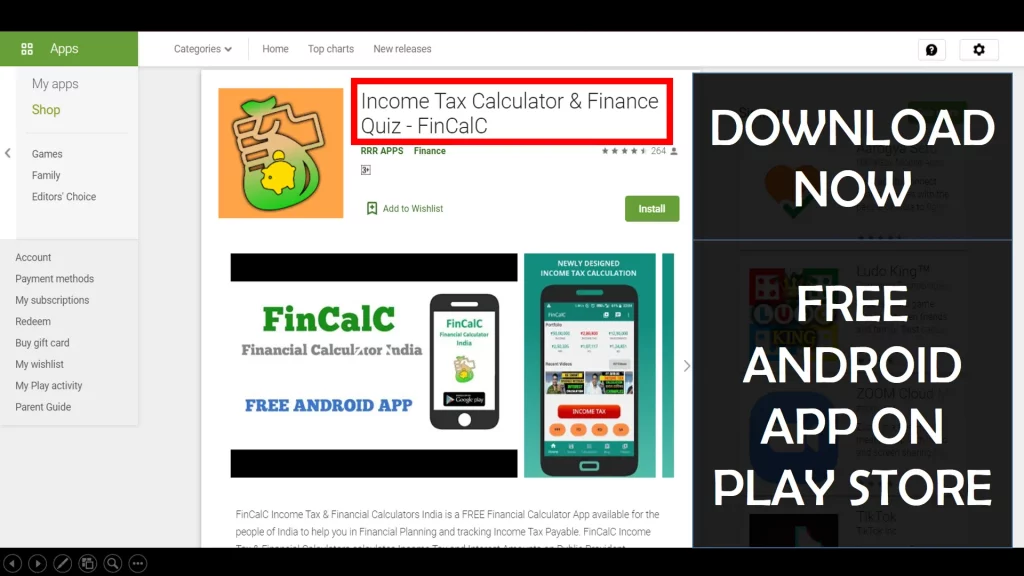
Use Popular Calculators:
- Income Tax Calculator
- Home Loan EMI Calculator
- SIP Calculator
- PPF Calculator
- HRA Calculator
- Step up SIP Calculator
- Savings Account Interest Calculator
- Lump sum Calculator
- FD Calculator
- RD Calculator
- Car Loan EMI Calculator
- Bike Loan EMI Calculator
- Sukanya Samriddhi Calculator
- Provident Fund Calculator
- Senior Citizen Savings Calculator
- NSC Calculator
- Monthly Income Scheme Calculator
- Mahila Samman Savings Calculator
- Systematic Withdrawal Calculator
- CAGR Calculator
I’d love to hear from you if you have any queries about Personal Finance and Money Management.
JOIN Telegram Group and stay updated with latest Personal Finance News and Topics.
Download our Free Android App – FinCalC to Calculate Income Tax and Interest on various small Saving Schemes in India including PPF, NSC, SIP and lot more.
Follow the Blog and Subscribe to YouTube Channel to stay updated about Personal Finance and Money Management topics.

